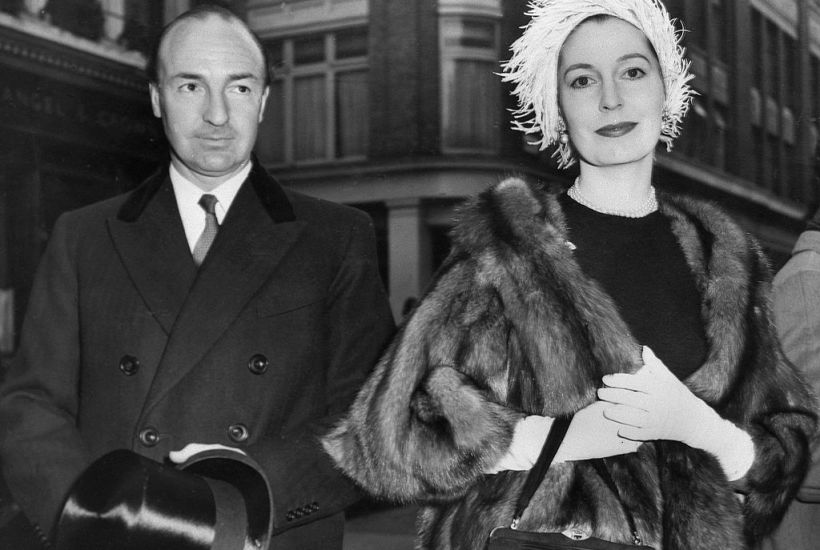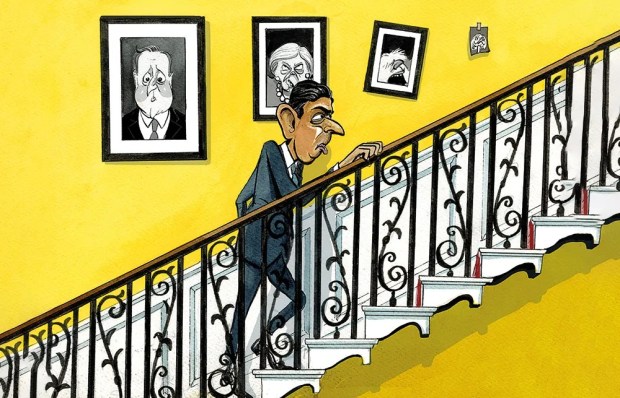These days our sex scandals seem like another symbol of Britain’s national decline. They are diminished, petty and tawdry, certainly compared to the grand affair that took its name from its main actor: John Profumo.
Sixty years ago today, on 5 June 1963, Profumo rose in the House of Commons to admit that he had lied to his wife, his cabinet colleagues, and the nation, about an affair with a 19-year-old model, and was therefore resigning and retreating into obscurity.
In the early 1960s Profumo was a rising star in the durable but tired Tory government of that eminent old Edwardian Harold Macmillan. He had enjoyed an exceptionally good war – serving in North Africa and landing in Normandy on D-Day, exactly 19 years before his spectacular fall.
His early political and social career had been as blessed by good fortune as his military one: educated at Harrow and Oxford, and elected as Tory MP for Kettering in a by-election, he was the ‘baby of the House’ – the youngest member – arriving in time to take part in the legendary Norway debate in 1940 that brought down Neville Chamberlain and elevated Winston Churchill to power.
Profumo voted against the Chamberlain government. David Margesson, the ferocious chief whip, said: ‘I can tell you this, you utterly contemptible little shit. On every morning that you wake up for the rest of your life, you will be ashamed of what you did last night’ . Unabashed, Profumo later remarked: ‘He couldn’t have been more wrong.’
Profumo lost his seat in the 1945 Labour landslide but was re-elected for Stratford-upon-Avon in 1950, and resumed his political ascent through the junior minister ranks. Meanwhile, he had wooed and married the film actress Valerie Hobson, a glamorous star whose luminous beauty shines through in classic movies like Kind Hearts and Coronets.
In July 1961 the Profumos were weekend guests of Lord Astor’s, the socialite owner of the Observer, at Cliveden, a magnificent Thamesside country home near Maidenhead. It was here that Nemesis lay in wait. It came in the shapely form of Christine Keeler, a beautiful 19-year-old showgirl who shared a weekend cottage at Cliveden with her mentor Stephen Ward.
Ward, later branded by the judge at his trial as ‘a thoroughly filthy fellow’ was a typical man on the make in sixties London just as it started to swing. He practiced as a successful osteopath, treating High Society patients like Astor who gratefully let him have his cottage at a peppercorn rent. Alongside his osteopaths’ practice, Ward was a skilled portrait artist whose clients and sitters included members of the Royal family and Churchill. In his mews house in Marylebone, he lived with Christine and another ‘model’, 18-year old Mandy Rice-Davies, whose lovers had included and Lord Astor himself.
As Astor, Profumo, and their wives strolled around the Cliveden grounds on that fateful weekend they came to the outdoor swimming pool where a riotous party was in progress. Someone had stolen Christine’s swimsuit, and as she splashed naked in the shallows the womanising war minister’s attention was naturally drawn.
He obtained her phone number and began an affair. The couple met at Ward’s home and at Profumo’s own house in Regents’ Park. Their assignations came to the attention of MI5, who were alarmed as Christine’s long list of lovers included Yevgeny Ivanov, a Russian intelligence officer whose cover was the post of naval attaché at the Soviet Embassy.
Profumo, as befitting the stiff upper lip of the wartime generation, maintained a dignified public silence over the affair for the rest of his life
The fact that Britain’s war minister was sharing a girlfriend with a Soviet spy at the height of the Cold War set Whitehall’s alarm bells jangling. It was the era of the building of the Berlin Wall and the Cuban Missile crisis, and the security nightmare that the state’s top secrets might be mentioned in pillow talk was obvious. Profumo was discreetly warned off his relationship by the spooks, and by the year’s end the affair was over.
Rumours of the relationship had also reached both the media and the flapping ears of George Wigg, the Labour party’s expert on security matters. Wigg asked a question in the Commons on the subject, forcing Profumo to lie that there had been ‘ no impropriety whatsoever’ in his relationship with Miss Keeler.
Grilled by a succession of his cabinet colleagues, the erring minister repeated his denials, and started to sue two Italian magazines which had named him. Then the affair burst into the public domain with the sound of seven gunshots.
The shots were fired by Johnny Edgecombe, an Antiguan-born member of the Windrush generation, who had also been having a stormy relationship with Christine Keeler. Edgecombe had slashed the face of a rival, Jamaican Aloyisius ‘Lucky’ Gordon, who he suspected of raping Keeler. When she refused to give evidence on his behalf, Edgecombe stormed round to the Marylebone mews to confront her.
Christine and Mandy refused to admit Edgecombe, who fired a fusillade of shots at their front door before departing. Though no one was hurt, the shooting gave the press the excuse they needed to report the swirling mass of rumours that the affair had generated. In the face of the storm of publicity it was clear to Profumo that the truth of his affair was bound to come out, and he confessed all – at first privately to his wife and then publicly in the House.
Britain in the summer of 1963 was in the grip of near hysteria: the court appearances of those caught up in the affair coincided with the sensational High Society divorce case of the Duke and Duchess of Argyll, featuring a Polaroid photo of the Duchess wearing nothing but a string of pearls performing oral sex on a man whose head was missing from the photo. The identity of the ‘headless man’ was a mystery, though rumour pointed the finger at Tory politician Duncan Sandys, onetime son-in-law to Winston Churchill.
Other rumours spoke of kinky aristocratic sex parties at which guests were invited to whip a man dressed as a maid wearing a label begging ‘Beat Me’ . It was all grist to the mill of TV satirical shows like That Was The Week That Was,which mercilessly mocked Macmillan and his ministers as out-of-touch fossils presiding over the decadent last days of empire.
The Establishment – a body only recently identified, by The Spectator’s Henry Fairlie no less – needed a scapegoat to deflect attention from itself. One was conveniently present in the imperfect person of Stephen Ward. Here was a man living with two girls of questionable morals who gloried in his reputation as Casanova in the world of High Society Society, as well as the underworld of drug-dealing in seedy clubs.
This mother of all scandals had everything: sex, spies, a shooting, a suicide, and a dying governing caste caught with its knickers down
In addition, Ward apparently fancied himself as a spy with contacts in MI5. It may have been he who first alerted the security service to Keeler’s simultaneous affairs with Profumo and Ivanov. At all events, in the Establishment’s eyes he was indeed ‘a thoroughly filthy fellow’ and a conveniently expendable one too.
Within days of Profumo’s resignation, Ward was arrested and charged with living off the immoral earnings of Keeler and Rice-Davies as prostitutes. The charge was trumped up nonsense. Ward was a fairly wealthy man with his earnings as an osteopath and artist, and his relationship with the two girls was that of a voyeuristic mentor rather than a pimp.
No matter. His trial at the Old Bailey was a circus at which Christine and Mandy and a stream of less glamorous good time girls pressured by the police were paraded before the delighted gaze of a prurient press and public. The judge’s summing up told Ward that he was doomed to prison and disgrace, and that night he took an overdose of Nembutal barbiturates and died. He left a note apologising for ‘disappointing the vultures’.
Jack Profumo’s fate was a happier one. His wife Valerie nobly stood by her man, and their marriage survived, although she tolerantly accepted that his dalliance with Keeler ‘wasn’t the first and probably won’t be the last’. Profumo, as befitting the stiff upper lip of the wartime generation, maintained a dignified public silence over the affair for the rest of his life.
By way of quietly rehabilitating himself, he went to work as a volunteer at the Toynbee Hall social centre in the impoverished East End, rising from cleaning the toilets to the charity’s chairman and chief fundraiser. Many of his political friends shunned him, but some – notably including the Queen and Queen Mother – refused to abandon him, and his atonement was recognised and rehabilitation rewarded when he was awarded the CBE for his charity work in the Queen’s Birthday Honours in 1975. He died aged 91 in 2006.
Politically, Profumo was a major factor in the slow demise of a tired Tory government in power for 13 years. Within six months of Profumo’s departure Macmillan, too, had resigned and the following year, 1964, Harold Wilson’s Labour Party narrowly won a general election.
Today’s scandals are transient trivia. The Profumo affair was a moment that marked a country in transition from deference to its ruling class to defiance of them. With its cast of aristocrats and politicians mingling with a new Britain of Caribbean immigrants, bold and brassy tarts, and an increasingly intrusive media, this mother of all scandals had everything: sex, spies, a shooting, a suicide, and a dying governing caste caught with its knickers down. After it, nothing would ever be quite the same again.
Got something to add? Join the discussion and comment below.
Get 10 issues for just $10
Subscribe to The Spectator Australia today for the next 10 magazine issues, plus full online access, for just $10.




















Comments
Don't miss out
Join the conversation with other Spectator Australia readers. Subscribe to leave a comment.
SUBSCRIBEAlready a subscriber? Log in